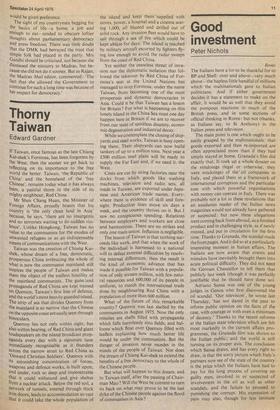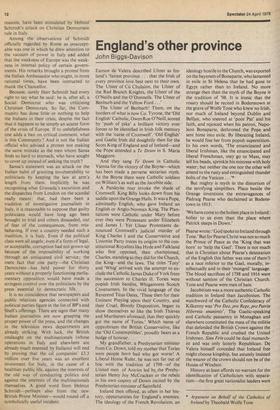Good investment
Peter Nichols
Rank, The Italians have a lot to be thankful for to BP and Shell: over and above—very much above—the hapless little handful of millions which the multinationals gave to Italian politicians. And if either government decides it has a statement to make on the affair, it would be as well that they avoid the pompous reactions in much of the British press, and in some sections of official thinking in Rome: but not (thanks, as Italians say, to St Anthony) in the Italian press and television.
The main point is one which ought to be easily grasped by the multinationals: that goods exported and then re-imported are often appreciated more than if they had simply stayed at home. Granada's film did exactly that. It took up a whole dossier on the misdoings (legal or otherwise, they were misdoings) of the oil companies in Italy, and placed them in a framework of international corruption and the particular ease with which powerful organisations with money can operate in Italy. There was probably not a lot in these revelations that an assiduous reader of the Italian news magazines would not already have gathered or suspected: but now these allegations were coming back from abroad, as a finished product and in challenging style, as if newly minted, and put in circulation for the first time. Thanks to Granada, the scandal made the front pages. And it did so at a particularly interesting moment in Italian affairs. The Italians are now aware that events and mistakes have inevitably brought them into acute political difficulty. They did not need the German Chancellor to tell them that publicly last week (though it was perfectly justifiable that he should have done so).
Adriano Sansa was one of the young judges in Genoa who first discovered the oil scandal. 'Our television', he wrote last Thursday, 'has not dared in the past to inform public opinion on the facts of the case, with courage or with even a minimum of decency.' Thanks to the recent reforms at the Italian state television which are felt most markedly in the current affairs programmes, the Granada film was shown to the Italian public; and the world is still turning on its proper axis. The conclusion which Sansa draws, and has every' right to draw, is that the sorry picture which Italy's partners now see of the state of the country is the price which the Italians have had to pay for the long process of covering up guilty men, involved in or suspected of involvement in the oil as well as other scandals, and the failure to proceed to punishing the corrupt. His expression of pain may also, though for less intimate reasons, have been stimulated by Helmut Schmidt's attack on Christian Democratic rule in Italy.
Among the observations of Schmidt officially regarded by Rome as unacceptable was one in which he drew attention to the vacuum of power in Italy arid added that the weakness of Europe was the weakness in internal policy of certain governments. His remarks brought a protest from the Italian Ambassador who might, in more rational times, have been instructed to thank the Chancellor.
Because, surely Herr Schmidt had every right to say what he said: he is, after all, a Social Democrat who was criticising Christian Democrats. So far, the Community has done little or nothing to help the Italians in their crisis, despite the fact that it happens to be simply an acuter form of the crisis of Europe. If to unhelpfulness one adds a ban on critical comment, what is this Community ? And is not the Italian official who advised a protest not making the same mistake as the men whom Sansa finds so hard to stomach, who have sought to cover up instead of seeking the truth ?
Sansa's statement was an attack on the Italian habit of granting invulnerability to politicians by keeping the law at arm's length from them. Implicitly he was recognising what Granada's excursion and the dispatches from London on the scandal really meant: that, had there been a tradition of investigative journalism in Italy, it is reasonable to suppose that guilty politicians would have long ago been brought to trial and others dissuaded, out of fear of the consequences, from misbehaving. If ever a country needed such a tradition, it is Italy. Even if the political class were all angels; even if a form of legal, or acceptable, corruption had not grown up because of the impossibility of working through an antiquated civil service; the mere fact that one party—the Christian Democrats—has held power for thirty years without a properly functioning parliamentary opposition would have made a stringent control over the politicians by the press 'essential to democratic life.
It is no coincidence that newspapers and public relations agencies connected with political parties figure in the list of BP's and Shell's offerings. There are signs that many Italian journalists are now grasping the proper power of the press, and the changes in the television news departments are already striking. With luck, the British onslaught on the multinationals (whose operations in Italy and elsewhere are already much resented by Italians) will end by proving that the oil companies' £3.3 million over five years was an excellent investment for Italy, in the cause of a healthier public life, against the interests of the old way of conducting politics and against the interests of the multinationals themselves. A good word from Helmut Schmidt—perhaps also from the new British Prime Minister—would round off a symbolically useful incident.



































 Previous page
Previous page